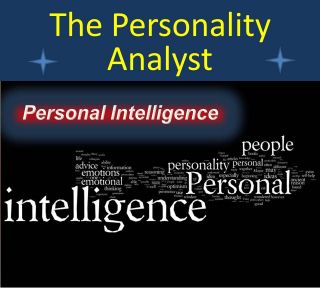Intelligence
How Many New Intelligences Are There?
There are a lot of books about intelligence out there, including mine.
Posted March 25, 2014

A lot of authors have put the word "intelligence" in their book titles over the past years. This includes my own new book, “Personal Intelligence,” and scores more. I decided to find out more about the kinds of intelligences that are being discussed.
Last week, I discussed the fact that intelligence researchers study many broad intelligences. These include verbal intelligence, perceptual-organizational intelligence, and spatial intelligence, as well as emotional intelligence and now, personal intelligence. A number of those broad intelligences are part of a standard model of intelligence used by intelligence researchers called the three-stratum model (see last week’s post). My impression is that book authors have—for whatever reason—written about a lot more intelligences than those that are included in the standard model.
So, are intelligence researchers missing something? To find out, I scoured the New York Public Library online card catalog for books with intelligence in the title—and also looked at Amazon.com. Here’s what I found:
Group 1. Titles on National and Organizational Intelligence Gathering and Analysis
First, the word intelligence is used is multiple ways, and there are a number of book titles that focus on national security (and organizational security)—that is, on intelligence gathering. I’ll designate that as the first group of intelligences outside the three-stratum model. It’s perfectly legitimate to use “intelligence” to refer to collecting intelligence—spying, that is. This is the intelligence of the KGB, the CIA, the British Secret Service, and the like. Some sample titles:
- The Art of Intelligence: Lessons from a Life in the CIA’s Clandestine Service (Henry A. Crumpton, 2013)
- Intelligence Analysis: A Target-Centric Approach (Robert M. Clark, 2012)
- Intelligence: From Secrets to Policy (M. Lowenthal, 2008)
Bottom line: These are serious works, and the intelligence-gathering community has an equal right to use the term “intelligence” as do psychologists. These books aren’t relevant to the three-stratum model and vice versa—no problem.
Group 2. Non-Human Intelligences
A second group of intelligences concern the ability of non-human entities to solve problems. Animals, plants and machines each have their own forms of intelligence and I’ve placed books that cover these intelligences in the category "non-human intelligence." Here are some examples of relevant titles:
- Plant Intelligence and the Imaginal Realm: Beyond the Doors of Perception into the Dreaming of Earth (Stephen Harrod Buhner, 2014).
- The Intelligence of Dogs (Stanley Coren, 2006)
- The Intelligence of Flowers (Maurice Maeterlinck and Phillip Mosley, 2007)
- The Nature of Horses: Exploring Equine Evolution, Intelligence, and Behavior (Stephen Budiansky, 1997)
- Extraterrestrial intelligence
Then there is the intelligence of machines:
- Artificial intelligence: A Modern Approach (Stuart Russell and Peter Norvig, 2009)
- Our Final Invention: Artificial Intelligence and the End of the Human Era (James Barrat, 2013)
And “emergent intelligences” (because they emerge from multiple organisms):
- Collective Intelligence: Mankind’s Emerging World in Cyberspace (Pierre Levy and Robert Bononno, 1999)
- Swarm Intelligence: What Nature Teaches Us About Shaping Creative Leadership (by James Haywood Rolling, 2013)
- Programming Collective Intelligence: Building Smart Web 2.0 Applications (Toby Segaran, 2007)
Bottom Line: I’ve divided this group of intelligences into three areas : A) living, B) machine, and C) emergent. Regarding animals, most people would agree that dogs and horses have their own special intelligences. Computers emulate human intelligences and sometimes use other processes to solve problems with intelligence. In the third area are “swarm” intelligences—that is, intelligences that emerge from many different organisms. None of this conflicts with—or necessarily directly informs—the three-stratum model of human intelligence. These intelligences are interesting to consider alongside human intelligences.
Group 3: Casual Uses of Intelligence to Refer to Talents, Training, Adaptations, Skills, and Expertise
Some authors use the term intelligence in a more casual than technical sense. Their books address knowledge in a specific area without claiming that a specific aptitude exists. A few examples:
- Language Intelligence: Lessons on Persuasion from Jesus, Shakespeare, Lincoln, and Lady Gaga (Joseph J. Romm, 2012)
- Financial Intelligence: A manager’s Guide to Knowing What the Numbers Really Mean (Karen Berman, Joe Knight and John Case, 2006).
- The Healing Intelligence of Essential Oils: The Science of Advanced Aromatherapy (Kurt Schnaubelt, 2011)
- Gut Feelings: The Intelligence of the Unconscious (Gerd Gigerenzer, 2008)
Bottom Line: Once again, there is no need to connect these uses of intelligence with the three-stratum model.
Group 4: Intelligences that Are Included in or Being Considered for the Three-Stratum Model
In addition to all the books in Groups 1 to 3 above, there are books about intelligences that are examined or being seriously considered as candidates for the three-stratum model—at least in the sense of having research studies about them. Here are some books that describe a few actively-researched intelligences:
- Emotional Intelligence (Dan Goleman, 1995)
- Emotional Intelligence 2.0 (Travis Bradberry, Jean Greaves and Patrick M. Lencioni, 2009)
- Creative Intelligence: Harnessing the Power to Create, Connect and Inspire (Bruce Nussbaum, 2014)
- People Smart: Developing Your Interpersonal Intelligence (Melvin L. Silberman and Freda Hansburg, 2000)
- Social Intelligence: The New Science of Human Relationships (Daniel Goleman, 2007)
- Frames of Mind (Howard Gardner, 1983; which postulated eight intelligences)
- Relational Intelligence: How Leaders Can Expand Their Influence Through a New Way of Being Smart (Steve Saccone, 2009)
- Personal intelligence: The Power of Personality and How it Shapes our Lives (John D. Mayer, 2014)
Bottom Line: Researchers examine the intelligences above, and if their findings seem promising, a given intelligence may become a candidate for inclusion in the three-stratum model. For example, in a recent article, researchers studied the Mayer-Salovey-Caruso Emotional Intelligence Test (MSCEIT) to see whether emotional intelligence was ready for inclusion within the model. (They argued that it was). I’m a fan of the test and theory (I’m a co-developer of both). That said, I think over time personal intelligence may supplant emotional intelligence as a broad intelligence, with emotional intelligence being seen as a more specific ability within the realm of personal intelligence.
Group 5: Interesting new suggestions for intelligences
A number of authors have offered additional suggestions for broad intelligences. Here are a few of note:
Morality and Ethics
- Ethical Intelligence: Five Principles for Untangling Your Toughest Problems at Work and Beyond (Bruce Weinstein, 2011)
- Building Moral Intelligence: The Seven Essential Virtues that Teach Kids to Do the Right Thing (Michele Borba, 2002)
Body, Sensory, and Sexual Intelligences
- Awakening Somatic Intelligence: The Art and Practice of Embodied Mindfulness (Kaparo, Hanson and Oschman, 2012)
- Visual Intelligence: How we Create What We See (Donald Hoffman, 2000)
- Sensation: The New Science of Physical Intelligence (Thalma Lobel, 2014)
- Mating Intelligence Unleashed: The Role of the Mind in Sex, Dating, and Love (Glenn Geher, Scott Barry Kaufman and Helen Fisher, 2013)
- Erotic Intelligence: Igniting Hot, Healthy Sex While in Recovery from Sex Addiction (Alexandra Katehakis, 2010).
- Sexual Intelligence: What We Really Want from Sex—and How to Get It (Marty Klein, 2012)
Spiritual intelligence
- SQ 21: The Twenty-One Sills of Spiritual Intelligence (Cindy Wigglesworth, 2012)
- Unbound Intelligence: Discovering the God Within (Rajeev Kurapati, 2014)
- Divine Intelligence: A Scientific System for Awakening the “God Within” (Jayne Gardner, 2014) “Advanced studies of brain function reveal this divine power exists within you..”
Others
- Psychic Intelligence: Tune In and Discover the Power of Your Intuition (Terry Jamison and Linda Jamison, 2012)
- Risk Intelligence: How to Live with Uncertainty (Dylan Evans, 2012)
- Positive Intelligence: Why only 20% of Teams and Individuals Achieve Their True Potential AND HOW YOU CAN ACHIEVE YOURS, (Shirzad Charmine, 0000),
- Conversational intelligence: How Great Leaders Build Trust & Get Extraordinary Results (Judith Glaser, 2013)
- Cultural Intelligence: Improving your CQ to Engage Our Multicultural World (David A. Livermore and Chap Clark, 2009).
Bottom Line: Human beings may possess broad intelligences that have not yet been adequately studied. This fifth group of books raises some interesting ideas in this regard. Some are plainly outside the sphere of the natural sciences (Unbound intelligence), but others could be further developed. If intelligence researchers take these authors seriously, they might want to explore ideas of moral/ethical intelligences, spiritual intelligences, and a physical intelligences. In another instance, Judith Glaser, the CEO of “Creating We” presents a plausible reframing of verbal and social intelligence in the idea of a conversational intelligence. The idea of a cultural intelligence also holds interest because of its potential importance in today’s world.
So, why do authors use "intelligence" in so many of their book titles? Well, the word "intelligence" has more than one meaning, of course. That acknowledged, "intelligence" is widely used to describe broad mental abilities. Maybe intelligence is an optimistic concept: Whether you agree or not that new intelligences are worth exploring, there are more human intelligences than the commonly measured abilities of verbal and perceptual-organizational intelligences. We also employ spatial intelligence, processing-speed intelligence, and personal intelligence to think in wide and flexible ways. A broader consideration of these mental capacities might inspire us to develop more of our talents—and reassure us that we have many talents to draw on. Although we each possess all-too-human frailties, we may also have more mental abilities available to us than we have yet to imagine—abilities we can use to help both ourselves and humanity.
Notes
Copyright © 2014 by John D. Mayer




